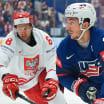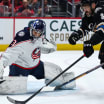For the Blue Jackets, the stretch run had two very distinct segments.
First was a 4-11-1 record over a 16-game span of March and April that left Columbus’ playoff aspirations dangling by a thread.
Then came a furious mad dash to the end, a six-game win streak that resuscitated the team's hopes but ultimately came up just two points short of returning the Blue Jackets to the Stanley Cup Playoffs for the first time since 2020.
For Don Waddell, there are lessons his team can take from both of those stretches. Facing the pressure and intensity of the race for a playoff spot for the first time in years, the Blue Jackets at first struggled to do the little things – scoring the first goal, tallying on the power play or getting a key save – that teams need to do to win do-or-die hockey games.
But to their credit, the Jackets figured it out, though just a game or two late to make the impact in the standings they wanted. Coming into the season, Waddell, the CBJ president of hockey operations and general manager, said one of the most important things his team could do this season was be in the mix at the end and experience what a playoff race is like.
It’s on-the-job, in-the-moment training that can’t be replicated.
“I think it’s big for a couple reasons,” Waddell said. “One is even though we went through a tough stretch in March, I always say March and April, for some reason, they’re harder than winning in October and November. It doesn’t make any sense, but that’s what we always talk about. We went through a dip in March, and to be honest, I was wondering if we were going to get out of it. It was getting tougher. We were playing really good teams. Everybody was playing for the playoffs there.
"But we did. That’s a strong sign of this locker room, the guys, how much they care for each other, how much they care for winning hockey games and getting to the postseason.”
It’s even more impressive that Columbus was able to get back on the right track considering just how young the roster is. Five of the team’s top eight scorers – Kirill Marchenko (age 24), Dmitri Voronkov (24), Kent Johnson (22), Cole Sillinger (21) and Adam Fantilli (20) – were 24 or younger, and for each of them it was their first taste in the NHL of what it’s like to be playing truly meaningful hockey down the stretch.
As Waddell noted, it’s one thing to score some goals and get some victories in October and November, when teams are still figuring out their systems and the grind hasn’t yet become the grind. It’s a totally different animal when the importance of two points gets magnified on a nightly basis.
“It was really good to see what it gets down to at this point,” Fantilli said. “Especially as a young guy, I’d never really experienced that. It’s good to see, but it takes more than what we had this year to reach the goals that we want to. We know that, and we know we have to put our best foot forward next year and not have some of the lulls that we had this year.
“It was great to see the level of play that we have to get to, and we all know that and we’re going to come back expecting it. Hopefully we can just get it done sooner.”
A silver lining also was found for head coach Dean Evason in the way the Blue Jackets finished the season. In particular, the last game of the season will stick in Evason’s mind, as the Blue Jackets skated out for game 82 at Nationwide Arena approximately 21 hours after finding out their playoff hopes had officially been dashed.
Rather than mope and turn in an uninspired or loose effort, the Blue Jackets played to the final whistle in a 6-1 win over the Islanders that sent CBJ fans home happy. To the head coach, it's a major building block in culture and play that he said he'll remind the team of a season from now.
“If you want to look as far as we talked about getting consistent in how we want to play, especially (in the last game) our team could have said, ‘Eh, let’s just play hockey. Let’s just play some riverboat hockey,’ or whatever the term is you want to use,” Evason said. “We didn’t do that. We played how the Columbus Blue Jackets play.
“Are we going to have to revisit that at training camp and dial it back in? I’m sure we are. But we might use that game and say, ‘If you can do that in a game that meant zero – zero – then we can start that way.’ And we have to start that way. We played really well at the end there. There’s stretches we did not play well that did not allow us to have enough points to play in the playoffs, so it has to be even more consistent than it was this year.”






















